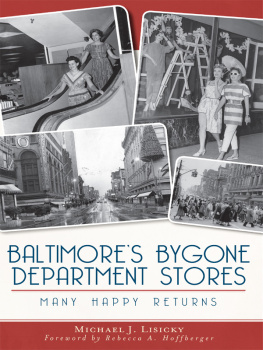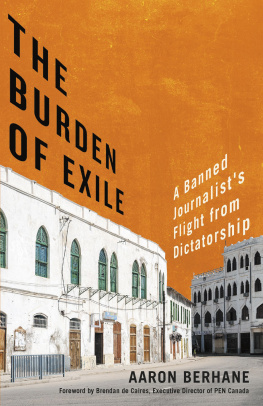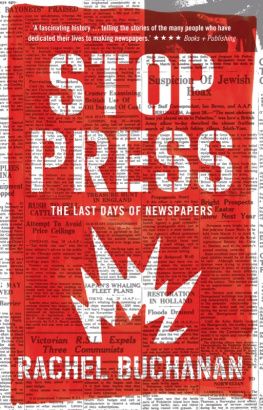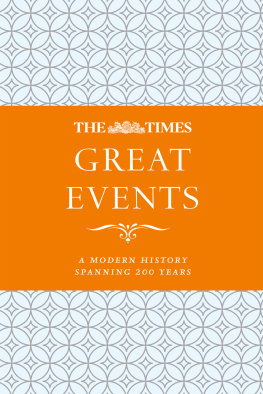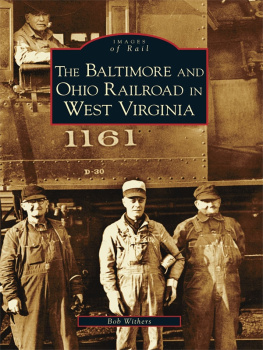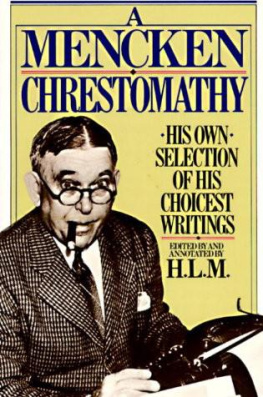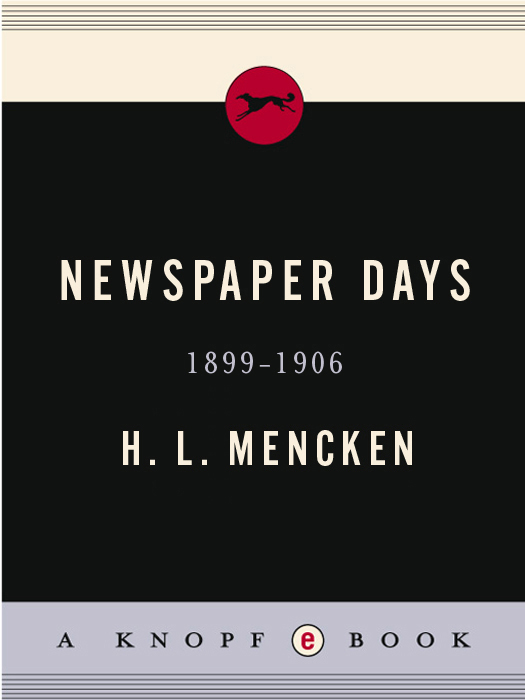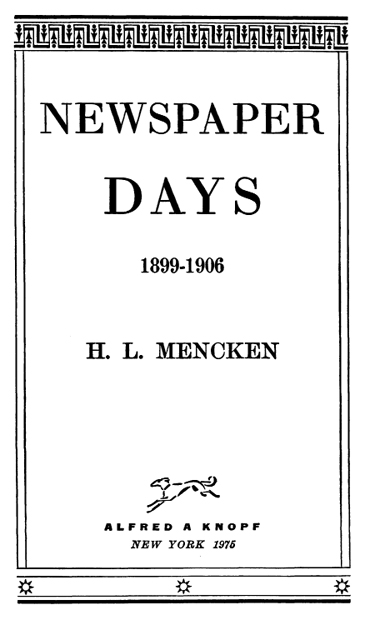A LISTING OF THE WORKS OF H. L. MENCKEN
PUBLISHED BY Alfred A. Knopf
WILL BE FOUND AT THE END OF THIS VOLUME
Copyright 1940, 1941 by Alfred A. Knopf, Inc. Copyright renewed 1968 by Mercantile Safe Deposit and Trust Company, Executor of the estate of H. L. Mencken. All rights reserved under International and Pan-American Copyright Conventions. Published in the United States by Alfred A. Knopf, Inc., New York, and in Canada by Random House of Canada Limited, Toronto. Manufactured in the United States of America and distributed by Random House, Inc., New York.
Published October 20, 1941
Reprinted Five Times
eISBN: 978-0-307-83091-3
v3.1
PREFACE
T HE RECOLLECTIONS here embalmed, I should say at once, have nothing in common with the high, astounding tales of journalistic derring-do that had a considerable run several years ago, after the devourers of best-sellers had begun to tire of medical memoirs. In the second half of the period here covered I became a city editor, which is to say, a fellow of high mightiness in a newspaper office, and at the very end I was lifted by one of fates ironies into even higher dignities, but the narrative has principally to do with my days as a reporter, when I was young, goatish and full of an innocent delight in the world. My adventures in that character, save maybe in one or two details, were hardly extraordinary; on the contrary they seem to me now, looking back upon them nostalgically, to have been marked by an excess of normalcy. Nevertheless, they had their momentsin fact, they were made up, subjectively, of one continuous, unrelenting, almost delirious momentand when I revive them now it is mainly to remind myself and inform historians that a newspaper reporter, in those remote days, had a grand and gaudy time of it, and no call to envy any man.
In the long, busy years following I had experiences of a more profound and even alarming nature, and if the mood were on me I could fill a book with inside stuff almost fit to match the high, astounding tales aforesaid. I roamed, in the practise of my trade, from the river Jordan in the East to Hollywood in the West, and from the Orkney Islands in the North to Morocco and the Spanish Main in the South, and, like every other journalist, I met, listened to and smelled all sorts of magnificoes, including Presidents and Vice-Presidents, generals and admirals, bishops and archbishops, murderers and murderesses, geniuses both scientific and literary, movie and stage stars, heavyweight champions of the world, Class A and Class B royalties, judges and hangmen, millionaires and labor goons, and vast hordes of other notables, including most of the recognized Csars and Shakespeares of journalism. I edited both newspapers and magazines, some of them successes and some of them not, and got a close, confidential view of the manner in which opinion is formulated and merchanted on this earth. My own contributions to the mess ran to millions of words, and I came to know intimately many of its most revered confectioners. More than once I have staggered out of editorial conferences dripping cold sweat, and wondering dizzily how God got along for so many years without the New Republic and the Manchester Guardian. And at other times I have marvelled that the human race did not revolt against the imposture, dig up the carcass of Johann Gutenberg, and heave it to the buzzards and hyenas in some convenient zoo.
A newspaper man in active practise finds it hard to remain a mere newspaper man: he is constantly beset by temptations to try other activities, and if he manages to resist them it takes a kind of fortitude that less protean men, badgered only by their hormones and their creditors, never have need of. I was born, happily, with no more public spirit than a cat, and have thus found it relatively easy to throw off all the commoner lures, but there have been times when the sirens fetched me clearly below the belt, and I did some wobbling. In 1912, though no one will ever believe it, I was groomed surreptitiously as a dark horse for the Democratic Vice-Presidential nomination, and if one eminent American statesman, X, had not got tight at the last minute, and another, Y, kept unaccountably sober, I might have become immortal. Two years later I was offered $30,000 cash, deposited in bank to my order, to write anti-Prohibition speeches for the illiterates in the two Houses of Congress. A little further on an Episcopal bishop asked me to tackle and try to throw a nascent convert, female and rich, who had thrice slipped out of his hands at the very brink of the font. Another time the prophet of a new religion, then very prosperous in the Middle West, offered to consecrate me as a bishop myself, with power to bind and loose; and almost simultaneously I was arrested on Boston Common on a charge of vending obscene literature to the young gentlemen of Harvard. I have seen something of the horrors of war, and much too much of the worse horrors of peace. On five several occasions I have been offered the learned degree of legum doctor, though few men are less learned in the law than I am, or have less respect for it; and at other times I have been invited to come in and be lynched by the citizens of three of the great Christian states of the Union.
Such prodigies and monstrosities I could pile up for hours, along with a lot of instructive blabbing about what this or that immortal once told me off the record, for I have had the honor of encountering three Presidents of the United States in their cups, not to mention sitting Governors of all the states save six. But I bear in mind Sir Thomas Overburys sneer at the fellow who chooseth rather to be counted a spy than not a politician, and maintains his reputation by naming great men familiarly, and so hold my peace: let some larval Ph.D. dig the dirt out of my papers marked Strictly Private: Destroy Unread after I shove off for bliss eternal. In the present book my only purpose is to try to recreate for myself, and for any one who may care to follow me, the gaudy life that young newspaper reporters led in the major American cities at the turn of the century. I believed then, and still believe today, that it was the maddest, gladdest, damndest existence ever enjoyed by mortal youth. At a time when the respectable bourgeois youngsters of my generation were college freshmen, oppressed by simian sophomores and affronted with balderdash daily and hourly by chalky pedagogues, I was at large in a wicked seaport of half a million people, with a front seat at every public show, as free of the night as of the day, and getting earfuls and eyefuls of instruction in a hundred giddy arcana, none of them taught in schools. On my twenty-first birthday, by all orthodox cultural standards, I probably reached my all-time low, for the heavy reading of my teens had been abandoned in favor of life itself, and I did not return seriously to the lamp until a time near the end of this record. But it would be an exaggeration to say that I was ignorant, for if I neglected the humanities I was meanwhile laying in all the worldly wisdom of a police lieutenant, a bartender, a shyster lawyer, or a midwife. And it would certainly be idiotic to say that I was not happy. The illusion that swathes and bedizens journalism, bringing in its endless squads of recruits, was still full upon me, and I had yet to taste the sharp teeth of responsibility. Life was arduous, but it was gay and carefree. The days chased one another like kittens chasing their tails.



